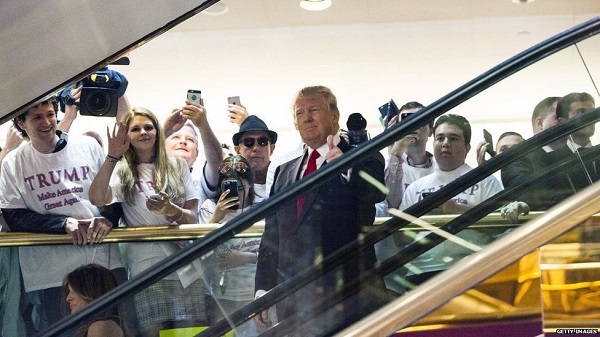Uncategorized
Tops on House Democrats’ to-do list: Try to end shutdown

WASHINGTON — House Democrats are sweeping into power this week on a campaign promise of improving government for ordinary Americans. But first, they’ll have to get government reopened from the partial shutdown.
As the Congress gavels in for the 116th session the early votes will be the usual ones — establishing the House rules and electing the House speaker, presumably California Democrat Nancy Pelosi. But the new majority will quickly pivot Thursday to a pair of bills to fund the parts of the government that have been shuttered in the dispute over money for President Donald Trump’s border wall with Mexico.
It’s a cold opening for the new majority, setting up an early confrontation with the Republican-led Senate and the White House and testing the House Democrats’ ability to make good on their campaign pledge to focus on kitchen-table issues in the new era of divided government.
“Our first order of business will be to end the reckless Trump shutdown and reopen the government,” Rep. Hakeem Jeffries of New York, the incoming caucus chairman, said in an interview. Then, he said, “we will turn our attention to bringing our democracy to life and returning our government to the people.”
So far, House Democrats appear largely unified in their plan to vote to reopen government without the money Trump is demanding to build the border wall.
Jeffries said that while Trump wants to “waste millions in taxpayer dollars on a medieval border wall,” Democrats are drawing “a line in the stand” against the spending they say won’t make the border any safer.
“The partisanship,
But with Trump dug in over the $5 billion he wants to build the wall, the shutdown could drag on. Senate Republicans are reluctant to consider the House bills unless they know the president is on board.
The first signal Trump has given that he may be willing to talk about the wall impasse came Tuesday, when he tweeted, “Let’s make a deal?” He’s invited Democratic and Republican congressional leaders to a White House meeting Wednesday on border security.
Democrats are eager to move forward in the House on multiple fronts.
They’re set to approve a rules package on Thursday that sets a new tone for governing. For example, it requires that legislation first be considered in committees before bills are brought to the floor for votes. It bans lawmakers from serving on corporate boards. And it recognizes the diversity of the new freshmen class by easing a century-old rule against wearing hats on the chamber floor to allow Rep.-elect Ilhan Omar, a Muslim-American from Minnesota, to wear a head scarf.
By early next week, House Democrats are expected to consider a resolution to defend the Affordable Care Act in legal proceedings after a Texas judge ruled it largely unconstitutional in a legal challenge brought by Republican attorneys general from several states.
H.R. 1, the first bill of the new House majority, is a good-government package that tackles campaign finance reforms and other issues. It will begin making its way through the newly bolstered committee process.
And they will continue their oversight of the Trump administration and Russian interference in the 2016 election.
Incoming Rules Committee Chairman Rep. Jim McGovern, D-Mass., insists the new majority can “walk and chew gum” at the same time.
Still, corralling a large House majority has never been easy, and Democrats are ushering in the largest class since the Watergate era. Republicans under retiring Speaker Paul Ryan all but gave up trying to the muscle the conservative House Freedom Caucus in line. It was the Freedom Caucus leaders who urged Trump to fight for the border wall money and reject legislation that would have prevented the shutdown days before Christmas.
Pelosi is expected to regain the gavel Thursday, securing the votes to become speaker even after some new and returning lawmakers
But divisions remain, rearing up even before the newly elected members are sworn into office, as many are eager for change and ready to confront Trump.
Rep.-elect Alexandria Ocasio-Cortez of New York has been critical of the leader’s plans to create a Select Committee on the Climate Crisis. She prefers a panel that focuses on renewable energy investments and whose members refuse campaign donations from oil and other fossil fuel industries.
“Our ultimate end goal isn’t a Select Committee,” Ocasio-Cortez tweeted as the panel was being formed. “Our goal is to treat Climate Change like the serious, existential threat it is by drafting an ambitious solution on the scale necessary – aka a Green New Deal – to get it done. A weak committee misses the point & endangers people.”
Trump and Republicans have been eager to widen those divisions, especially as the shutdown stretches into its second week.
Republican Rep. Kevin McCarthy of California, the incoming minority leader, panned the Democratic effort to reopen government without wall money.
Democrats vow to stay united as they work to reopen government, and press on with the priorities.
“As my mother used to say, ‘This too shall pass,'” Jeffries said. “We will get past this shutdown and there will be ample opportunity for us to communicate with the American people and get things done on their behalf.”
___
Follow on Twitter at https://twitter.com/lisamascaro
Lisa Mascaro, The Associated Press
Uncategorized
Kananaskis G7 meeting the right setting for U.S. and Canada to reassert energy ties


Energy security, resilience and affordability have long been protected by a continentally integrated energy sector.
The G7 summit in Kananaskis, Alberta, offers a key platform to reassert how North American energy cooperation has made the U.S. and Canada stronger, according to a joint statement from The Heritage Foundation, the foremost American conservative think tank, and MEI, a pan-Canadian research and educational policy organization.
“Energy cooperation between Canada, Mexico and the United States is vital for the Western World’s energy security,” says Diana Furchtgott-Roth, director of the Center for Energy, Climate and Environment and the Herbert and Joyce Morgan Fellow at the Heritage Foundation, and one of America’s most prominent energy experts. “Both President Trump and Prime Minister Carney share energy as a key priority for their respective administrations.
She added, “The G7 should embrace energy abundance by cooperating and committing to a rapid expansion of energy infrastructure. Members should commit to streamlined permitting, including a one-stop shop permitting and environmental review process, to unleash the capital investment necessary to make energy abundance a reality.”
North America’s energy industry is continentally integrated, benefitting from a blend of U.S. light crude oil and Mexican and Canadian heavy crude oil that keeps the continent’s refineries running smoothly.
Each day, Canada exports 2.8 million barrels of oil to the United States.
These get refined into gasoline, diesel and other higher value-added products that furnish the U.S. market with reliable and affordable energy, as well as exported to other countries, including some 780,000 barrels per day of finished products that get exported to Canada and 1.08 million barrels per day to Mexico.
A similar situation occurs with natural gas, where Canada ships 8.7 billion cubic feet of natural gas per day to the United States through a continental network of pipelines.
This gets consumed by U.S. households, as well as transformed into liquefied natural gas products, of which the United States exports 11.5 billion cubic feet per day, mostly from ports in Louisiana, Texas and Maryland.
“The abundance and complementarity of Canada and the United States’ energy resources have made both nations more prosperous and more secure in their supply,” says Daniel Dufort, president and CEO of the MEI. “Both countries stand to reduce dependence on Chinese and Russian energy by expanding their pipeline networks – the United States to the East and Canada to the West – to supply their European and Asian allies in an increasingly turbulent world.”
Under this scenario, Europe would buy more high-value light oil from the U.S., whose domestic needs would be back-stopped by lower-priced heavy oil imports from Canada, whereas Asia would consume more LNG from Canada, diminishing China and Russia’s economic and strategic leverage over it.
* * *
The MEI is an independent public policy think tank with offices in Montreal, Ottawa, and Calgary. Through its publications, media appearances, and advisory services to policymakers, the MEI stimulates public policy debate and reforms based on sound economics and entrepreneurship.
As the nation’s largest, most broadly supported conservative research and educational institution, The Heritage Foundation has been leading the American conservative movement since our founding in 1973. The Heritage Foundation reaches more than 10 million members, advocates, and concerned Americans every day with information on critical issues facing America.
Uncategorized
Poilievre on 2025 Election Interference – Carney sill hasn’t fired Liberal MP in Chinese election interference scandal

From Conservative Party Communications
“Yes. He must be disqualified. I find it incredible that Mark Carney would allow someone to run for his party that called for a Canadian citizen to be handed over to a foreign government on a bounty, a foreign government that would almost certainly execute that Canadian citizen.
“Think about that for a second. We have a Liberal MP saying that a Canadian citizen should be handed over to a foreign dictatorship to get a bounty so that that citizen could be murdered. And Mark Carney says he should stay on as a candidate. What does that say about whether Mark Carney would protect Canadians?
“Mark Carney is deeply conflicted. Just in November, he went to Beijing and secured a quarter-billion-dollar loan for his company from a state-owned Chinese bank. He’s deeply compromised, and he will never stand up for Canada against any foreign regime. It is another reason why Mr. Carney must show us all his assets, all the money he owes, all the money that his companies owe to foreign hostile regimes. And this story might not be entirely the story of the bounty, and a Liberal MP calling for a Canadian to be handed over for execution to a foreign government might not be something that the everyday Canadian can relate to because it’s so outrageous. But I ask you this, if Mark Carney would allow his Liberal MP to make a comment like this, when would he ever protect Canada or Canadians against foreign hostility?
“He has never put Canada first, and that’s why we cannot have a fourth Liberal term. After the Lost Liberal Decade, our country is a playground for foreign interference. Our economy is weaker than ever before. Our people more divided. We need a change to put Canada first with a new government that will stand up for the security and economy of our citizens and take back control of our destiny. Let’s bring it home.”
-

 Business2 days ago
Business2 days agoCanada’s critical minerals are key to negotiating with Trump
-

 Alberta2 days ago
Alberta2 days agoUnified message for Ottawa: Premier Danielle Smith and Premier Scott Moe call for change to federal policies
-

 David Clinton22 hours ago
David Clinton22 hours agoWhy Are Ontario’s Public Schools So Violent?
-

 Economy2 days ago
Economy2 days agoOttawa’s muddy energy policy leaves more questions than answers
-

 Business20 hours ago
Business20 hours agoSenator wants to torpedo Canada’s oil and gas industry
-

 Bruce Dowbiggin20 hours ago
Bruce Dowbiggin20 hours agoFUBAR: How Trudeau & Trump Rewrote This Century’s Political Handbook
-

 Business2 days ago
Business2 days agoRFK Jr. planning new restrictions on drug advertising: report
-

 Alberta1 day ago
Alberta1 day agoAlberta’s carbon diet – how to lose megatonnes in just three short decades






